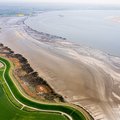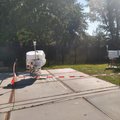Latest news
27 August 2020
The Netherlands was almost 3% sunnier during the coronavirus crisis

The amount of solar radiation that reached the Earth’s surface increased during the period when measures to limit the spread of coronavirus were in place. Researchers Pier Siebesma and Marieke Dirksen (KNMI/TU Delft) came to that conclusion.
20 August 2020
Greenland Ice Sheet experienced record losses in 2019, and it won’t stop there

The Greenland Ice Sheet recorded a new record mass loss in 2019, other glaciers in the Arctic region have also been severely affected by the summer of 2019.
02 July 2020
Bricks made out of mud and cow-dung to regulate indoor climate

During his research career, Yask Kulshreshtha has been on a quest to invent new building materials that are affordable, locally available and help to reuse organic waste materials. He has for instance developed solutions to make traditional mud houses in rural India water resistant.
30 June 2020
Historic floods reveal how salt marshes can save lives in the future

Coastal wetlands like salt marshes are increasingly recognized as valuable natural defenses that protect coasts against strong wave attacks.
23 June 2020
New measuring equipment accurately maps out the atmosphere above the TU Delft Campus

A compact and mobile cloud radar will deliver high resolution images of the cloud compositions above the TU Delft Campus.
11 June 2020
Help from an unexpected quarter: geosciences data techniques can help predict corona spread

An international team of scientists is studying the possibility of using data assimilation, a data technique from geosciences, to predict the spread of coronavirus and the efficacy of certain measures. TU Delft geoscientists on the team think that data assimilation might prove a useful tool for the RIVM epidemiologists. A paper on the subject has been submitted to scientific journal Foundations of Data Science.
02 June 2020
Efficiency and Safety in Geothermal Operations

A fund of 3.4M€ has been awarded by the European Commission to a project on geothermal energy, that will be led by researcher Maren Brehme (TU Delft). The project entitled ‘EASYGO: Efficiency and Safety in Geothermal Operations‘ is one of the Innovative Training Networks meant for extraordinary global research as well as excellent training opportunities for PhD candidates to reach doctorate level.